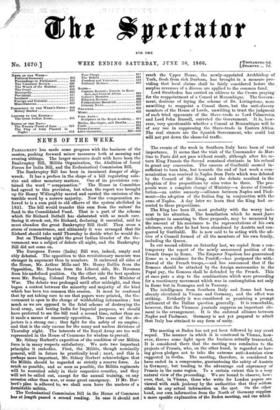The events of the week in Southern Italy have been
of vast importance. It seems that the visit of the Commander de Mar- tino to Paris did not pass without result, although after his re- turn King Francis the Second remained obstinate in his refusal to grant any concession. The success of Garibaldi seemed in- sufficient to turn him, but towards the end of last week a com- munication was received in Naples from Paris which was debated by the Council of the King, and the debate resulted in the adoption of five propositions by nine votes to three. The pro- posals were a complete change of Ministry—a decree of Consti- tution—an entire amnesty—alliance between Naples and Pied- mont—the adoption of the Italian flag in conjunction with the arms of Naples. A day later we learn that the King had as- sented to these propositions.
The King has been ill, most probably with the worry inci- neat tb his situation. The humiliation which he must jhave undergone in assenting to these proposals, may be measured by the amount of his resistance to the representations of his own advisers, even after he had been abandoned by Austria and con- quered by Garibaldi. He is now said to be acting with the ad- vice of a Council formed of all the members of his own family, including the Queen.
In our second edition on Saturday last, we copied from a con- temporary the report of the newly announced position of the French troops in Rome. The Emperor Napoleon has guaranteed Rome as a residence for the Pontiff,—has postponed the with- drawal of the French troops,—and has announced that if the Romans should be attacked by the foreign mercenaries in the Papal pay, the Romans shall be defended by the French. This at once puts a stop to the combinations which were proceeding for a reactionary movement which was in contemplation not only in Rome but in Romagna and in Tuscany.
The intelligence from Southern Italy and Rome had been already circulated in Vienna and Germany, and the effect was striking. Evidently it was considered as promising a prompt settlement of the Italian question generally. It is remarkable, hoWever, that the Viennese journals suppress an important ele- ment in the arrangement. It is the enforced alliance between Naples and Piedmont. Germany is not yet prepared to admit that Italy has attained to any form of unity.


























